immune support
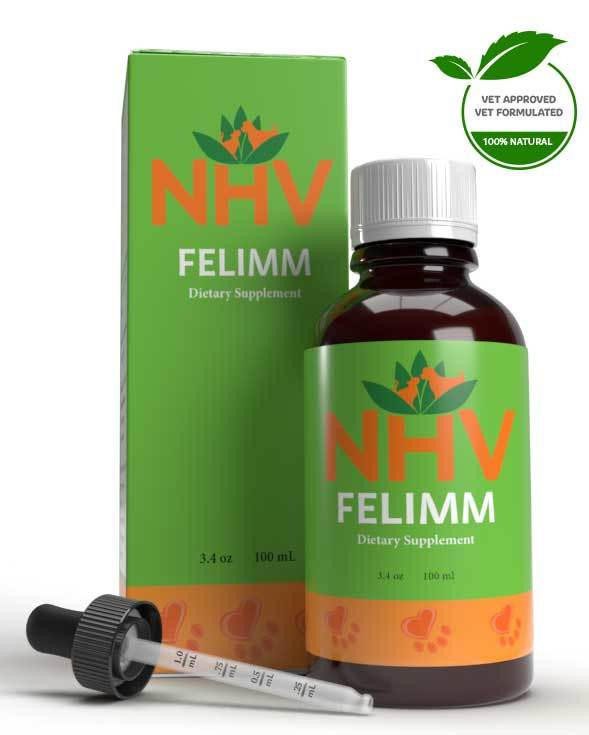
free shipping over $100 (USA & Canada)
1-877-937-4372 the pet expert hotline
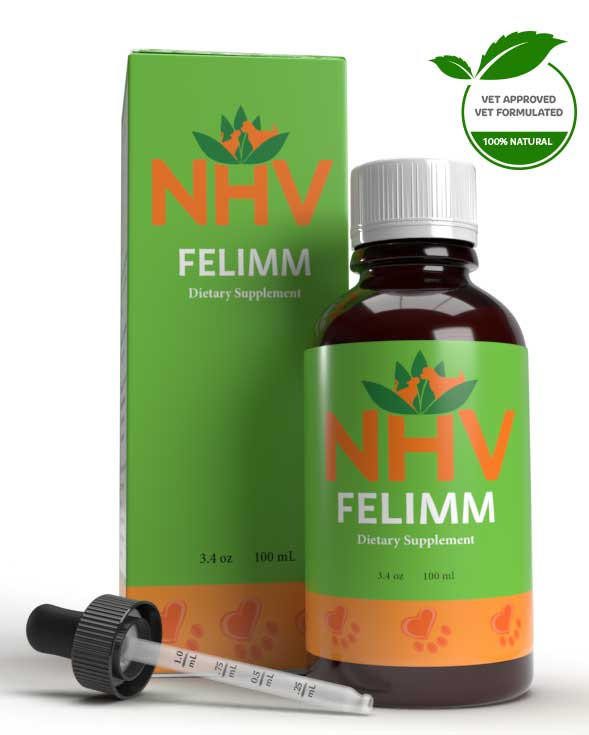
Natural herbal supplement to help your dog fight many viral, fungal, and bacterial related infections.

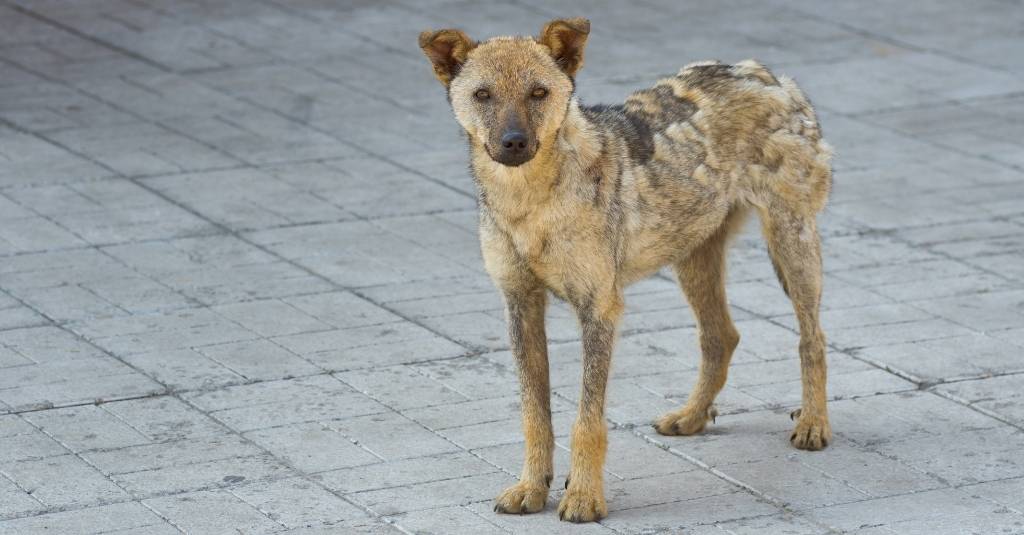
In our veterinary practice, we see a lot of cat and dog patients with itchy skin. One reason for an itchy pet is ringworm infection. Ringworm, which is actually not a worm but a fungus on the skin and top layers of hair, is caused by fungi called dermatophytes. The most common of these fungi in pets is called Microsporum canis.
Ringworm is highly contagious to humans, especially to children, the elderly, and the immunocompromised. Dogs and cats have an increased chance of contracting ringworm from environments that are densely populated with animals, like an animal shelter or kennel. Pets with illness or a weak immune system are also at risk for ringworm.
Ringworm is highly contagious to humans.
Humans infected with ringworm get red and itchy skin lesions in the shape of a ring. In dogs and cats, it also presents as a ring on the skin and is sometimes accompanied by hair loss. Sometimes, especially in mild cases, it is difficult to notice a ringworm infection in your pet due to little hair loss. Severe cases of ringworm can lead to large amounts of fur loss coupled with scaly, dry, irritated circular lesions, poor hair and coat, red or darkened skin, and itchiness.
In some cases, dermatophytosis shows as raised, rounded, knotty (nodular) lesions known as granulomatous lesions, or boils, and raised nodular lesions that frequently ooze. There may also be inflammation of the fur surrounding the claw. Occasionally, dogs and cats are classified as carriers; harboring the disease-causing fungus, but presenting no visible signs of the condition. However, even these dogs and cats are contagious to humans and other animals.
Diagnosing ringworm in dogs and cats is done by a thorough exam by your veterinarian. It will involve a combination of testing, including a culture of the lesions, and another testing including a skin scrape, and tape test, to rule out other causes of the skin disease, and may even include a skin biopsy. Dogs and cats most commonly develop ringworm because of infections with the fungi Microsporum canis, Microsporum gypseum, and Trichophyton mentagrophytes. The incidence of each fungus varies according to your geographical location.
In severe cases, quarantine procedures should be considered due to the infective and zoonotic (transmittable to humans) nature of some types of dermatophytosis.
If your veterinarian needs to prescribe antifungal medications- topical and oral are available depending on the severity of the infection.
Cleaning the environment to remove contaminated hair is recommended to prevent reinfection and new infections. Vacuuming, washing down surfaces, and restricting your dog or cat to areas where cleaning can be done easily is recommended. Treatment may take up to 6 weeks depending on the case.
Excellent nutrition, and immune boosting supplements are recommended to hasten healing and prevent infection.
NHV Felimm, which contains herbs that are useful in fighting fungal and viral infections is recommended. As well, use the Ouch Away Spray, which helps with inflammation, infection, and hair growth.
For additional immune support, try the BK-Detox and ES-Clear, which are particularly useful for immunocompromised animals.
NHV PetOmega 3, omega fish oils are always recommended as they help with skin and coat conditions. Finally, Matricalm is useful when an animal is constantly stressed, thereby decreasing its immune system.
Is your pet suffering from ringworm? Would you like some professional holistic advice? Please contact us for an online veterinary consultation, or feel free to contact the NHV Pet Experts.
immune support

Helps your pet fight Feline Leukemia, FIV virus,other viral infections, and lymphoma
buy 2 and save $3
3 month supply for a small to medium size pet.

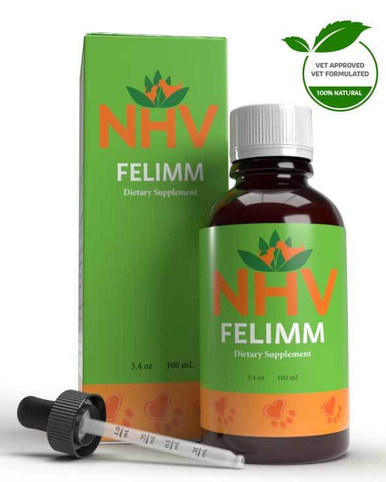

FeLV and FIV have a strong negative impact on your cat’s immune system and general wellbeing. Left untreated, FeLV can cause serious health issues and other cancers, including lymphoma. Add this natural support to the symptomatic treatment for feline leukemia and FIV that your vet recommends along with diet and nutrition to give them the best fighting chance.
It’s important to help balance your cat’s immune system to help them defend against daily contact with environmental bacteria, fungi, viruses, and protozoa.
NHV’s all-natural supplements for feline leukemia and FIV are formulated by a master herbalist, and a holistic veterinarian with over 20 years of experience.
Felimm for cats contains powerful herbal ingredients that help in fighting viruses and balancing your kitty’s natural immune system.
Add this natural support to the treatment for feline leukemia recommended by your veterinarian. Read more about leukemia and FIV on the holistic veterinarian, Dr. Hillary Cook’s blog.
With the right support cats with FeLV and FIV can lead healthy lives.
NHV offers a Feline Leukemia (FeLV) Kit which is available in both a fighter pack and immune and antioxidant support pack. We also provide a Feline Immunodeficiency Virus (FIV) Kit because, at NHV, we believe in giving our pet parents everything they need to care for their kitty naturally.
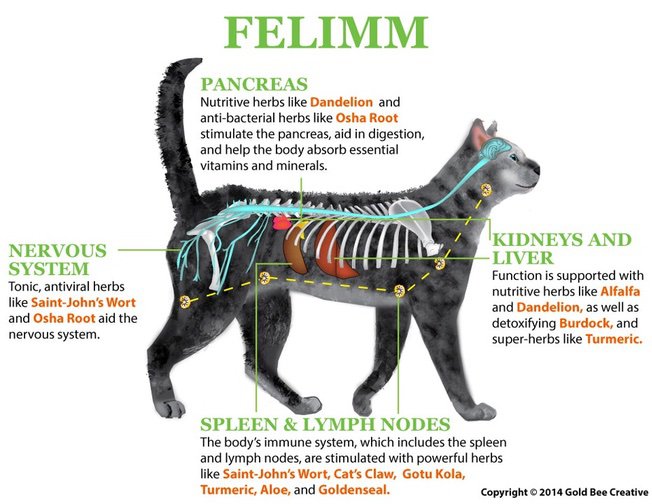
St. John’s Wort – A potent antiviral that helps control viral infections and stimulates your cat’s immune system.
Turmeric – A powerful antioxidant that helps fight the damaging effects of free radicals. It strengthens liver function and contains strong antifungal properties.
Aloe Vera – Contains Acemannan, which has been proposed as an adjunctive therapy for cats with FIV. Aloe also contains high levels of vitamins, minerals, amino acids, and other nutrients important for cats with immune disorders.
Alfalfa – Contains high levels of chlorophyll, which works as an antioxidant in your cat's bloodstream. It also contains nutrients beneficial to cats with immune disorders.
Burdock – Helps cleanse the body of toxins and waste that accumulate during illness. It is also high in calcium, phosphorus, iron, thiamine, and riboflavin.
Cat’s Claw – A powerful anti-inflammatory and antioxidant that supports your cat’s immune system and helps strengthen its defenses against viruses like leukemia.
Osha – A natural immune builder that helps pets fight infections including FeLV and FIV. Also has antibacterial and antiviral properties.
Dandelion – A highly nutritious food that stimulates liver secretion, improves digestion and stimulates appetite. It also protects the kidneys and has anti-inflammatory properties.
Gotu Kola– An antioxidant-rich herb known to strengthen the immune system and protect cells from damage caused by free radicals. Helps calm the nervous system.
Usnea – An immune system stimulant with anti-bacterial and anti-fungal properties that help protect your cat’s weakened immune system from Candida Albicans.
Goldenseal – An immune supporting herb with blood cleansing properties.
Myrrh – Helps control bacterial infections that cats with compromised immune systems are so vulnerable to.
Select your pet's weight to determine the correct dose.
To be taken twice daily. Determine your pet’s weight and then use the easy chart below to determine the correct dose. This is the minimum dosage.
Pet's Weight Dosage
0 - 15 lb = 0.5 ml
16 - 30 lb = 1.0 ml
31 - 45 lb = 1.5 ml
46 - 60 lb = 2.0 ml
61 - 75 lb = 2.5 ml
Over 75 lb = 3.0 ml
How to Administer
Shake well before use. The easiest method is to use the dropper provided and place the drops into your pet’s food or favorite treat. You can also use the dropper and squirt directly into the pet’s mouth. Some pets can be finicky, if this occurs consider hiding the drops in foods most pet’s love such as fish, chicken or yogurt or a favourite treat. If your pet only eats dry food then soak a few kibbles at feeding time.
For Best Results
Herbal dietary supplements are beneficial to the health and well-being of your pet and are safe for long-term use. Every pet responds to natural herbal supplements differently, therefore it is important to be consistent and administer the product daily. Supplements generally take two to four weeks to take effect, however this will vary from one animal to the next.
Product Storage
All NHV Natural Pet Products are pure herbal extracts and contain no artificial additives, preservatives or coloring. Shelf life after opening is 6 months and must be refrigerated after opening.
Cautions and Contraindications
Do not use Felimm in pregnant or nursing animals. Speak to your vet before using our products. A second visit is recommended if your pet’s condition does not improve, or deteriorates after continued use of the supplements.
All information provided by NHV Natural Pet Products is for educational purposes only.
FeLV and FIV have a strong negative impact on your cat’s immune system and general wellbeing. Left untreated, FeLV can cause serious health issues and other cancers, including lymphoma. Add this natural support to the symptomatic treatment for feline leukemia and FIV that your vet recommends along with diet and nutrition to give them the best fighting chance.
It’s important to help balance your cat’s immune system to help them defend against daily contact with environmental bacteria, fungi, viruses, and protozoa.
NHV’s all-natural supplements for feline leukemia and FIV are formulated by a master herbalist, and a holistic veterinarian with over 20 years of experience.
Felimm for cats contains powerful herbal ingredients that help in fighting viruses and balancing your kitty’s natural immune system.
Add this natural support to the treatment for feline leukemia recommended by your veterinarian. Read more about leukemia and FIV on the holistic veterinarian, Dr. Hillary Cook’s blog.
With the right support cats with FeLV and FIV can lead healthy lives.
NHV offers a Feline Leukemia (FeLV) Kit which is available in both a fighter pack and immune and antioxidant support pack. We also provide a Feline Immunodeficiency Virus (FIV) Kit because, at NHV, we believe in giving our pet parents everything they need to care for their kitty naturally.

St. John’s Wort – A potent antiviral that helps control viral infections and stimulates your cat’s immune system.
Turmeric – A powerful antioxidant that helps fight the damaging effects of free radicals. It strengthens liver function and contains strong antifungal properties.
Aloe Vera – Contains Acemannan, which has been proposed as an adjunctive therapy for cats with FIV. Aloe also contains high levels of vitamins, minerals, amino acids, and other nutrients important for cats with immune disorders.
Alfalfa – Contains high levels of chlorophyll, which works as an antioxidant in your cat's bloodstream. It also contains nutrients beneficial to cats with immune disorders.
Burdock – Helps cleanse the body of toxins and waste that accumulate during illness. It is also high in calcium, phosphorus, iron, thiamine, and riboflavin.
Cat’s Claw – A powerful anti-inflammatory and antioxidant that supports your cat’s immune system and helps strengthen its defenses against viruses like leukemia.
Osha – A natural immune builder that helps pets fight infections including FeLV and FIV. Also has antibacterial and antiviral properties.
Dandelion – A highly nutritious food that stimulates liver secretion, improves digestion and stimulates appetite. It also protects the kidneys and has anti-inflammatory properties.
Gotu Kola– An antioxidant-rich herb known to strengthen the immune system and protect cells from damage caused by free radicals. Helps calm the nervous system.
Usnea – An immune system stimulant with anti-bacterial and anti-fungal properties that help protect your cat’s weakened immune system from Candida Albicans.
Goldenseal – An immune supporting herb with blood cleansing properties.
Myrrh – Helps control bacterial infections that cats with compromised immune systems are so vulnerable to.
Select your pet's weight to determine the correct dose.
To be taken twice daily. Determine your pet’s weight and then use the easy chart below to determine the correct dose. This is the minimum dosage.
Pet's Weight Dosage
0 - 15 lb = 0.5 ml
16 - 30 lb = 1.0 ml
31 - 45 lb = 1.5 ml
46 - 60 lb = 2.0 ml
61 - 75 lb = 2.5 ml
Over 75 lb = 3.0 ml
How to Administer
Shake well before use. The easiest method is to use the dropper provided and place the drops into your pet’s food or favorite treat. You can also use the dropper and squirt directly into the pet’s mouth. Some pets can be finicky, if this occurs consider hiding the drops in foods most pet’s love such as fish, chicken or yogurt or a favourite treat. If your pet only eats dry food then soak a few kibbles at feeding time.
For Best Results
Herbal dietary supplements are beneficial to the health and well-being of your pet and are safe for long-term use. Every pet responds to natural herbal supplements differently, therefore it is important to be consistent and administer the product daily. Supplements generally take two to four weeks to take effect, however this will vary from one animal to the next.
Product Storage
All NHV Natural Pet Products are pure herbal extracts and contain no artificial additives, preservatives or coloring. Shelf life after opening is 6 months and must be refrigerated after opening.
Cautions and Contraindications
Do not use Felimm in pregnant or nursing animals. Speak to your vet before using our products. A second visit is recommended if your pet’s condition does not improve, or deteriorates after continued use of the supplements.
All information provided by NHV Natural Pet Products is for educational purposes only.
dermatitis relief
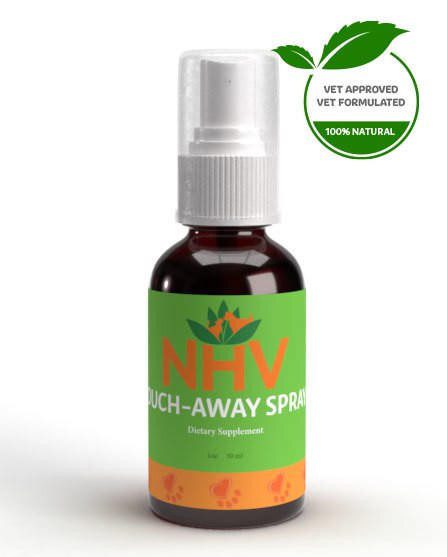
Holistic Support for Dermatitis, Mange and Yeast Infections
buy 2 and save $3
Your furkiddo’s skin can be sensitive to things like environmental allergies, biting insects, fungal overgrowth and much more! To self-soothe, your pup may start to bite, lick, or scratch themselves causing inflammation and possible hair loss. NHV Ouch Away, dog skin infection spray, helps your pup get on top of skin and coat issues naturally.

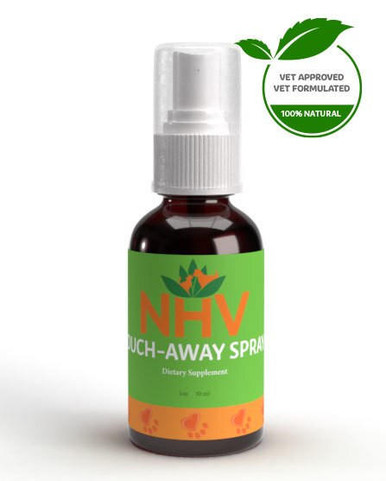
Your furkiddo’s skin can be sensitive to things like environmental allergies, biting insects, fungal overgrowth and much more! To self-soothe, your pup may start to bite, lick, or scratch themselves causing inflammation and possible hair loss. NHV Ouch Away, dog skin infection spray, helps your pup get on top of skin and coat issues naturally.

Natural Support for Dermatitis, Mange and Skin Infections
Your pup's skin is their largest organ! And because of this, their skin is constantly susceptible to infection, airborne irritants, icky biting insects and much more. Your furkiddo will scratch and bite when they are feeling stressed and have ouchies on their body. This obsessive behavior can introduce unwanted bacteria, whether it is from the environment or your pup’s own body, which can lead to infection. An itchy, inflamed ‘dog hot spot’ can be the end result. If these dog hot spots are left untreated, they can progress to secondary skin infections, abscesses or even metastatic tumors (eg. carcinoma). Ouch Away spray, dog skin infection spray, helps heal inflamed, itchy skin and promotes hair regrowth.
How NHV's Dog Skin Infection Spray Relieves Irritated Skin
Since your pup’s skin is their largest organ, it probably doesn't surprise you that skin issues are the most common health concern in dogs. These include (but are not limited to) dermatitis, mange and skin infections.
Dermatitis in dogs is a hypersensitivity or allergic reaction to a variety of common and typically harmless environmental substances. These allergens include grasses, pollens, house dust mites, or mold spores. Breeds predisposed to developing allergies include Chinese Shar-Peis, Wire Fox Terriers, Golden Retrievers, Dalmatians, Boxers, Boston Terriers, Labrador Retrievers, Lhasa Apsos, Scottish Terriers, Shih Tzus, and West Highland White Terriers. However, any breed (purebred or mixed) can be susceptible to allergies. The areas most affected are generally the paws, face, ears, front legs, and abdomen, but scratching all over the body is fairly common too. Ouch Away Spray for dog skin infections, contains ingredients like Chamomile, Marigold and Aloe vera that cools and soothes wounds, burns and irritated skin while strengthening the immune system.
The most common signs of dermatitis in dogs are:
Dog mange is caused by mites and can lead to inflamed skin and nasty sores. Scabies or sarcoptic mange is contagious and is transmissible to humans. Black mange is not transmissible to humans due to it being a genetic condition. Secondary bacterial and yeast infections may develop if left untreated while sores on the skin can build up and release a powerful musty odor. You can learn more about mange and how to help your dog if they are suffering from it in Dr. Cook's article on mange. Ingredients like Rosemary, Tea Tree oil and Lemongrass oil, within the Ouch Away Spray, are effective topically against external parasites, combating skin infections and helping to stimulate fur regrowth (from constant biting and scratching).
Help Support Your Dog Naturally
NHV Ouch Away Spray, dog skin infection spray, is an effective topical spray that is 100% natural and vet-formulated to soothe your pup’s skin, coat issues, and dog hot spots. To learn more about what causes dog hot spots and how to help your furry friend, read our vet talk or watch our video about skin infections. Get in touch with an NHV pet expert if you have any questions or concerns about skin and coat health - we are always here to help!
Made with the finest, organically grown, or ethically harvested herbs. Made specifically for pets, vet-formulated and vet approved.
How to Administer
Topical Spray: Spray several times a day to affected area until healed. It may some times be necessary to shave or trim your pet’s hair so that the Ouch Away spray reaches the affected area. If necessary, cover the affected area with gauze dressing.
Caution
Do not spray near or into eyes or nose. May initially sting on an open cut. A vet examination prior to use of this product is recommended. If your pet’s condition does not improve or deteriorates consult your vet and stop the use of the product.
Information presented by NHV Natural Pet Products is for educational purposes only.
Natural Support for Dermatitis, Mange and Skin Infections
Your pup's skin is their largest organ! And because of this, their skin is constantly susceptible to infection, airborne irritants, icky biting insects and much more. Your furkiddo will scratch and bite when they are feeling stressed and have ouchies on their body. This obsessive behavior can introduce unwanted bacteria, whether it is from the environment or your pup’s own body, which can lead to infection. An itchy, inflamed ‘dog hot spot’ can be the end result. If these dog hot spots are left untreated, they can progress to secondary skin infections, abscesses or even metastatic tumors (eg. carcinoma). Ouch Away spray, dog skin infection spray, helps heal inflamed, itchy skin and promotes hair regrowth.
How NHV's Dog Skin Infection Spray Relieves Irritated Skin
Since your pup’s skin is their largest organ, it probably doesn't surprise you that skin issues are the most common health concern in dogs. These include (but are not limited to) dermatitis, mange and skin infections.
Dermatitis in dogs is a hypersensitivity or allergic reaction to a variety of common and typically harmless environmental substances. These allergens include grasses, pollens, house dust mites, or mold spores. Breeds predisposed to developing allergies include Chinese Shar-Peis, Wire Fox Terriers, Golden Retrievers, Dalmatians, Boxers, Boston Terriers, Labrador Retrievers, Lhasa Apsos, Scottish Terriers, Shih Tzus, and West Highland White Terriers. However, any breed (purebred or mixed) can be susceptible to allergies. The areas most affected are generally the paws, face, ears, front legs, and abdomen, but scratching all over the body is fairly common too. Ouch Away Spray for dog skin infections, contains ingredients like Chamomile, Marigold and Aloe vera that cools and soothes wounds, burns and irritated skin while strengthening the immune system.
The most common signs of dermatitis in dogs are:
Dog mange is caused by mites and can lead to inflamed skin and nasty sores. Scabies or sarcoptic mange is contagious and is transmissible to humans. Black mange is not transmissible to humans due to it being a genetic condition. Secondary bacterial and yeast infections may develop if left untreated while sores on the skin can build up and release a powerful musty odor. You can learn more about mange and how to help your dog if they are suffering from it in Dr. Cook's article on mange. Ingredients like Rosemary, Tea Tree oil and Lemongrass oil, within the Ouch Away Spray, are effective topically against external parasites, combating skin infections and helping to stimulate fur regrowth (from constant biting and scratching).
Help Support Your Dog Naturally
NHV Ouch Away Spray, dog skin infection spray, is an effective topical spray that is 100% natural and vet-formulated to soothe your pup’s skin, coat issues, and dog hot spots. To learn more about what causes dog hot spots and how to help your furry friend, read our vet talk or watch our video about skin infections. Get in touch with an NHV pet expert if you have any questions or concerns about skin and coat health - we are always here to help!
Made with the finest, organically grown, or ethically harvested herbs. Made specifically for pets, vet-formulated and vet approved.
How to Administer
Topical Spray: Spray several times a day to affected area until healed. It may some times be necessary to shave or trim your pet’s hair so that the Ouch Away spray reaches the affected area. If necessary, cover the affected area with gauze dressing.
Caution
Do not spray near or into eyes or nose. May initially sting on an open cut. A vet examination prior to use of this product is recommended. If your pet’s condition does not improve or deteriorates consult your vet and stop the use of the product.
Information presented by NHV Natural Pet Products is for educational purposes only.
dermatitis relief
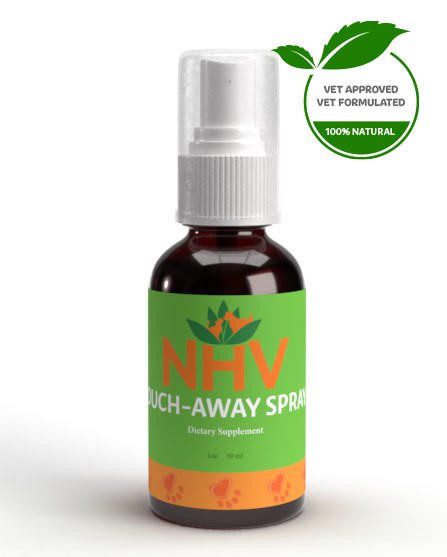
Natural Cat Allergy Spray for Hot Spots
buy 2 and save $3
Ouch Away for Cats
Protect your cat’s skin naturally. Sensitivities to food, environmental allergens and biting insects can cause your kitty to lick or bite irritated skin, causing a ‘hot spot’ to form. NHV Ouch Away for Cats is a topical spray that helps soothe cat skin allergies and recover fur loss.


Ouch Away for Cats
Protect your cat’s skin naturally. Sensitivities to food, environmental allergens and biting insects can cause your kitty to lick or bite irritated skin, causing a ‘hot spot’ to form. NHV Ouch Away for Cats is a topical spray that helps soothe cat skin allergies and recover fur loss.

Natural Support for Cat Skin Allergies and Hot Spots
What Is A Hot Spot?
A hot spot (aka moist dermatitis) is an inflamed skin lesion that may be further irritated by licking, scratching and chewing, often turning red, becoming infected, and 'hot' to the touch. Kitties are very sensitive and may have very delicate skin, so even small changes in their diet or environment can strongly affect them. The inflamed skin can be very uncomfortable for your kitty, and they may even experience fur loss.
Causes of Hot Spots on Cats
A few factors can cause hot spots in our feline friends, like food sensitivities, allergens in the environment, biting insects, and infections. Kitties with longer coats may be more susceptible to hot spots, especially when the weather is humid (like in the summer months). In most cases, hot spots are caused by allergies to the environment or something in their diet. Cat skin allergies most often develop on their paws, face, ears, front legs, and belly, but itchiness all over the body is common as well.
How NHV's Natural Cat Allergy Spray Relieves Inflamed Skin
If your kitty is licking, biting, or scratching a specific area, they may be experiencing a great level of discomfort. Ingredients like Chamomile, Marigold and Aloe vera are beneficial for soothing skin lesions, reducing swelling and easing discomfort. The immunostimulatory properties in Ouch Away help regulate a healthy histamine response to rebalance the immune system and help prevent infection. Herbs like Tea Tree oil and Lemongrass are effective topically against biting insects (fleas, mites, mosquitos and flies) and fighting infections, while ingredients like Rosemary encourage hair regrowth (recovery from alopecia).
Help Support your Cat Naturally
NHV Ouch Away Spray is an all-natural spray that is non-toxic for your furkiddo and formulated by an experienced herbalist and holistic vet. To learn more about hot spots in cats, check out our blog post about it. Get in touch with an NHV pet expert if you have questions about your kitty’s unique health needs.
Made with the finest, organically grown, or ethically harvested herbs. Made specifically for pets, vet-formulated and vet approved.
How to Administer
Topical Spray: Spray several times a day to affected area(s) until healed. It may sometimes be necessary to shave or trim your pet’s hair so that the Ouch Away Spray reaches the affected area. If necessary, cover the affected area with gauze dressing.
Caution
Do not spray near or into eyes or nose. May initially sting on open cut. A vet examination prior to use of this product is recommended. If your pet’s condition does not improve or deteriorates consult your vet and stop the use of the product.
Information presented by NHV Natural Pet Products is for educational purposes only.
Natural Support for Cat Skin Allergies and Hot Spots
What Is A Hot Spot?
A hot spot (aka moist dermatitis) is an inflamed skin lesion that may be further irritated by licking, scratching and chewing, often turning red, becoming infected, and 'hot' to the touch. Kitties are very sensitive and may have very delicate skin, so even small changes in their diet or environment can strongly affect them. The inflamed skin can be very uncomfortable for your kitty, and they may even experience fur loss.
Causes of Hot Spots on Cats
A few factors can cause hot spots in our feline friends, like food sensitivities, allergens in the environment, biting insects, and infections. Kitties with longer coats may be more susceptible to hot spots, especially when the weather is humid (like in the summer months). In most cases, hot spots are caused by allergies to the environment or something in their diet. Cat skin allergies most often develop on their paws, face, ears, front legs, and belly, but itchiness all over the body is common as well.
How NHV's Natural Cat Allergy Spray Relieves Inflamed Skin
If your kitty is licking, biting, or scratching a specific area, they may be experiencing a great level of discomfort. Ingredients like Chamomile, Marigold and Aloe vera are beneficial for soothing skin lesions, reducing swelling and easing discomfort. The immunostimulatory properties in Ouch Away help regulate a healthy histamine response to rebalance the immune system and help prevent infection. Herbs like Tea Tree oil and Lemongrass are effective topically against biting insects (fleas, mites, mosquitos and flies) and fighting infections, while ingredients like Rosemary encourage hair regrowth (recovery from alopecia).
Help Support your Cat Naturally
NHV Ouch Away Spray is an all-natural spray that is non-toxic for your furkiddo and formulated by an experienced herbalist and holistic vet. To learn more about hot spots in cats, check out our blog post about it. Get in touch with an NHV pet expert if you have questions about your kitty’s unique health needs.
Made with the finest, organically grown, or ethically harvested herbs. Made specifically for pets, vet-formulated and vet approved.
How to Administer
Topical Spray: Spray several times a day to affected area(s) until healed. It may sometimes be necessary to shave or trim your pet’s hair so that the Ouch Away Spray reaches the affected area. If necessary, cover the affected area with gauze dressing.
Caution
Do not spray near or into eyes or nose. May initially sting on open cut. A vet examination prior to use of this product is recommended. If your pet’s condition does not improve or deteriorates consult your vet and stop the use of the product.
Information presented by NHV Natural Pet Products is for educational purposes only.
Published: September 15, 2017